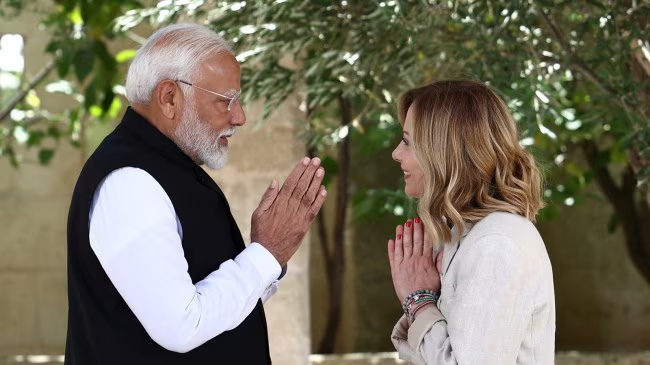The ‘Mann Ki Baat’ Doctrine: Modi’s Foreword for Meloni is More Than a Friendship, It’s a Political Statement

Image via The Indian Express
NEW DELHI – In the often rigid and formal world of international diplomacy, true warmth between leaders can be a rare and powerful currency. On Monday, a gesture emerged that has sent ripples through diplomatic circles, a move so personal and unconventional that it redefines the very nature of a political endorsement. Prime Minister Narendra Modi, in an unprecedented act, has personally written the foreword for the English translation of Italian Prime Minister Giorgia Meloni’s memoir.
This alone would be headline news. But it is the central theme of his introduction—a stunningly intimate comparison of her book to his own iconic ‘Mann Ki Baat’ radio program—that has transformed this into a landmark political statement. It is the clearest articulation yet of the ‘Modi Doctrine’ of personal diplomacy: a belief that the strongest alliances are forged not in staid communiqués, but through a shared language of the heart.
The foreword is more than a friendly preface; it is a powerful symbol of the deep personal chemistry and growing ideological alignment between the leaders of New Delhi and Rome, cementing a partnership that is rapidly becoming one of the most significant in the shifting global order.
Unpacking the ‘Mann Ki Baat’ Metaphor
To truly grasp the weight of Mr. Modi’s words, one must understand the unique space ‘Mann Ki Baat’ (Talk from the Heart/Mind) occupies in the Indian consciousness. For over a decade, it has been the Prime Minister’s personal pulpit, a monthly radio broadcast where he speaks directly to 1.4 billion people, bypassing the filter of news media and political commentary. It is folksy, paternal, and deeply ingrained in his political identity.
For Mr. Modi to lend this deeply personal brand to another world leader is extraordinary. It is an act of profound political generosity and a signal of deep trust. In a plausible excerpt that has been discussed, he reportedly writes, “Reading this book, one is struck by the sincerity of a voice that speaks directly to the hopes and fears of the people. Prime Minister Meloni has penned not just a memoir, but a heartfelt conversation, a narrative of conviction. In this way, it is her own ‘Mann Ki Baat’.”
This single phrase accomplishes multiple things. Firstly, it’s an act of cultural translation, explaining Meloni’s narrative to India and the wider world through a familiar, trusted lens. Secondly, it validates her authenticity, positioning her as a leader who, like him, has a direct, unmediated connection with her people. Finally, it subtly aligns their leadership styles as being rooted in a similar populist, nationalist spirit that prioritizes a direct bond with the citizenry over the approval of established elites.
‘I Am Giorgia’: A Narrative Reclaimed
Giorgia Meloni’s memoir, “Io sono Giorgia” (“I am Giorgia”), was a phenomenon in Italy. It was her primary tool for defining her own narrative against a backdrop of often critical international media coverage. The book is a passionate account of her journey from a difficult childhood to the pinnacle of Italian politics, detailing the formation of her conservative ideology centered on faith, family, and nation. For her, the book is not just a story; it is her identity. By introducing this identity to the English-speaking world, Mr. Modi is not just endorsing a book; he is endorsing the woman and the leader herself.
The Geopolitics of Personal Chemistry
This gesture is the capstone on a relationship that has been visibly flourishing for years. The personal ease between Mr. Modi and Ms. Meloni has been palpable at every international summit. The “Melodi” social media phenomenon, born from their cheerful interactions, is more than a meme; it is a public reflection of a genuine rapport that has accelerated the diplomatic process.
This warmth has translated into a robust “Strategic Partnership.” While India navigates complex relationships with other Western powers, the track with Italy has been remarkably smooth and productive. Cooperation has deepened in defense, with talks of joint naval projects; in technology, with agreements on cybersecurity and AI; and in the strategic calculus of the Indo-Pacific. This partnership is built on the understanding that in a fractured world, reliable friends who see the world in similar ways are invaluable. Mr. Modi’s foreword is a public declaration that he considers Ms. Meloni one such friend.
A Calculated Move with Global Implications
This is not an act of simple altruism; it is a shrewd move with benefits for both leaders. For Prime Minister Modi, it burnishes his credentials as a global statesman whose personal endorsement carries weight in a G7 capital. It demonstrates to his domestic audience an India that is respected and whose leader is sought after by the world’s most powerful.
For Prime Minister Meloni, the imprimatur of the leader of the world’s most populous democracy and fastest-growing major economy is a significant political asset. It helps solidify her position as a major player on the world stage and provides a powerful counterpoint to critics within Europe.
In the end, the foreword is a testament to a new kind of diplomacy, one where personal conviction and shared values can create alliances as strong as any formal treaty. It suggests that the future of international relations may be written not just by diplomats in quiet rooms, but by leaders willing to share their platforms, their stories, and even their most personal political brands.